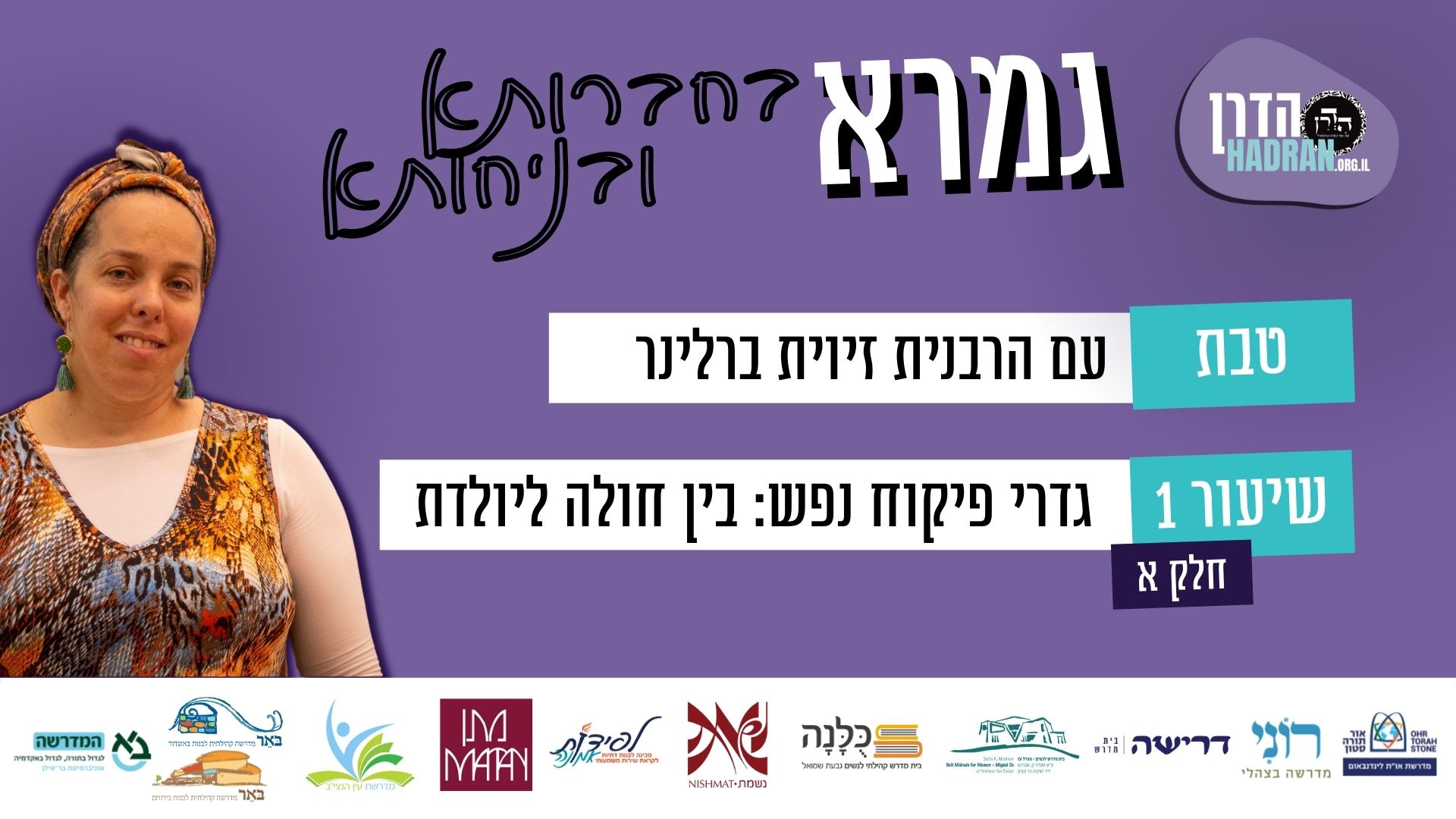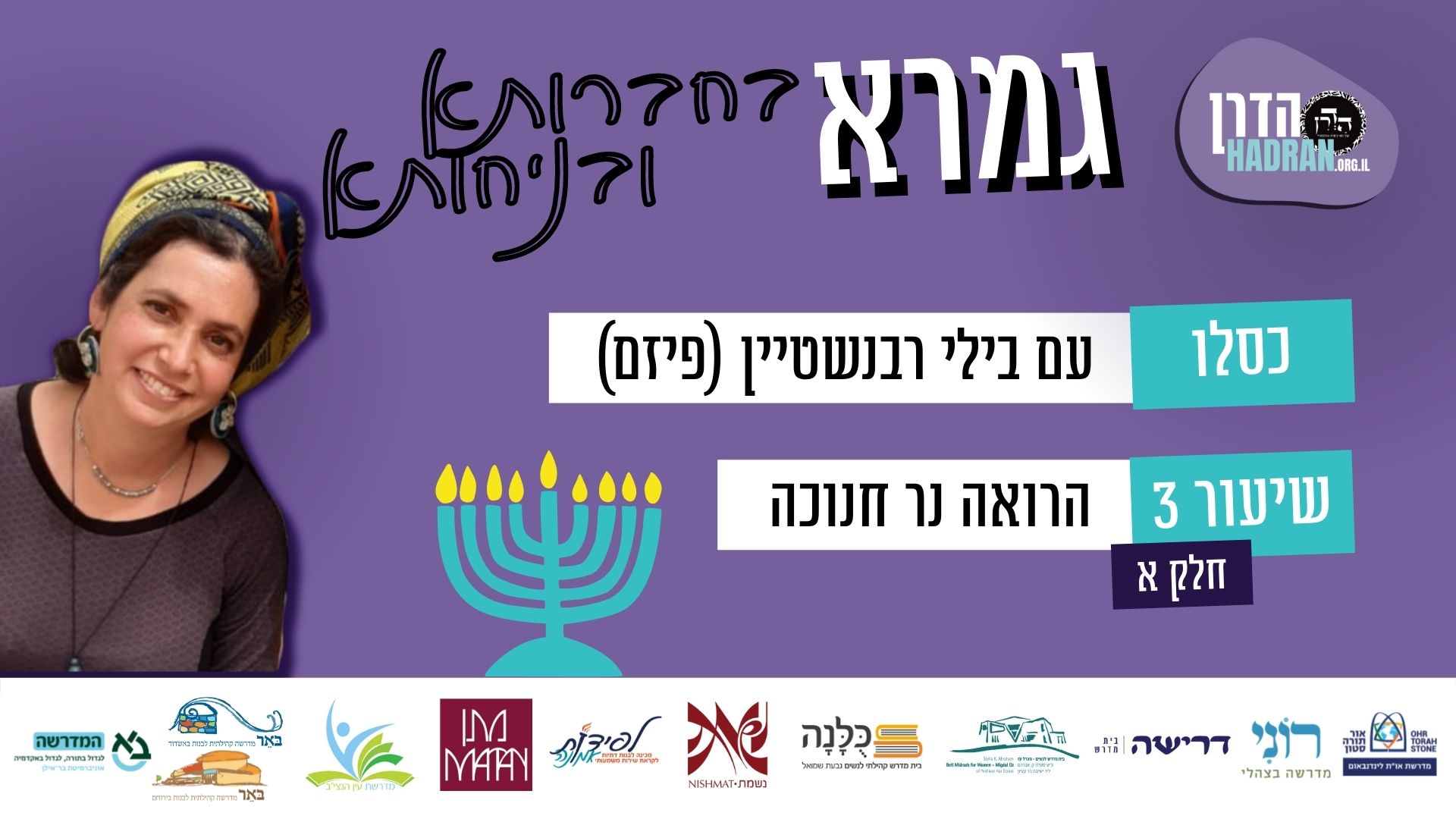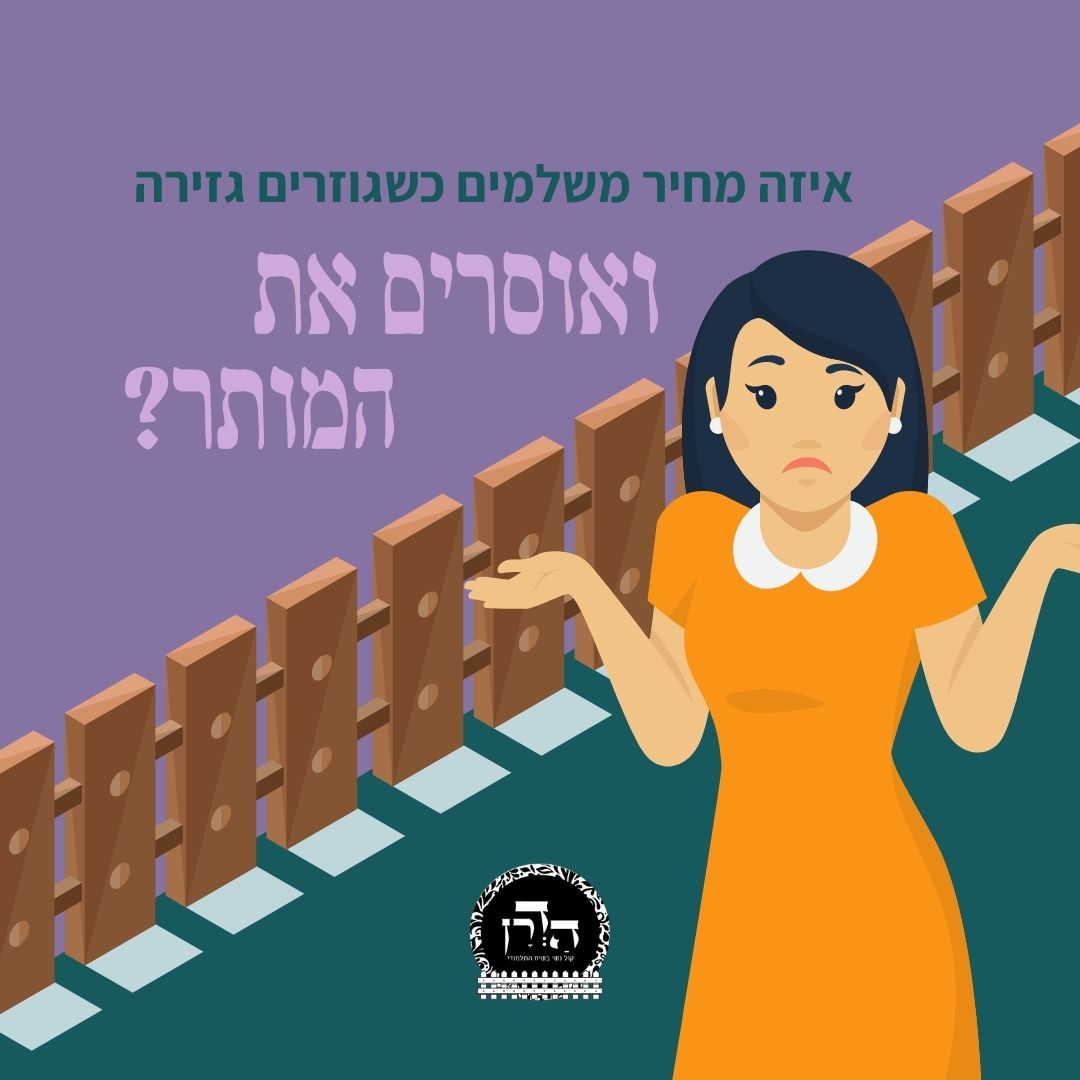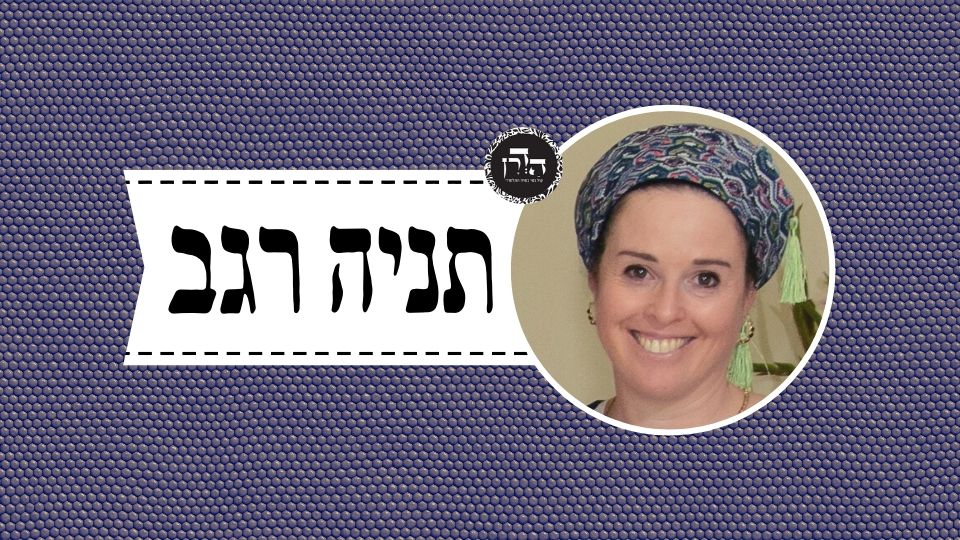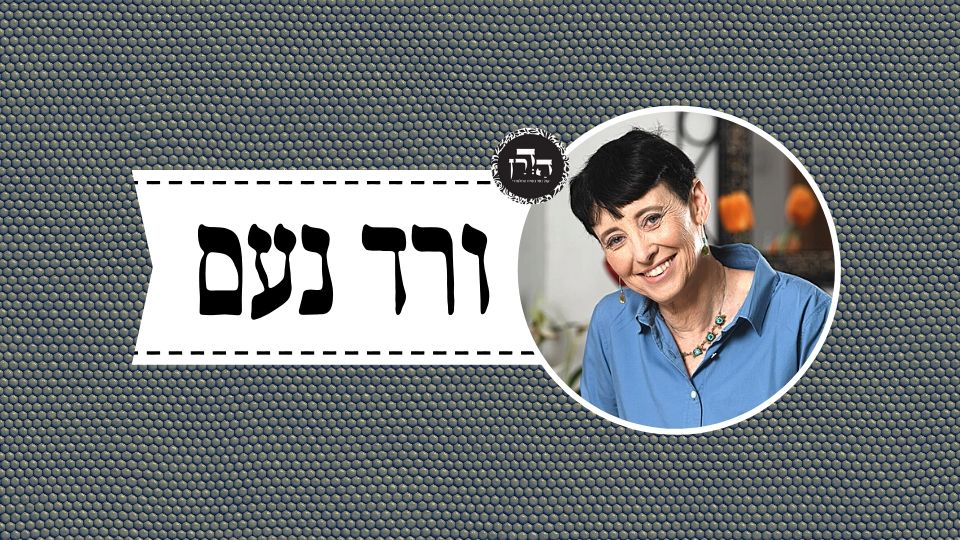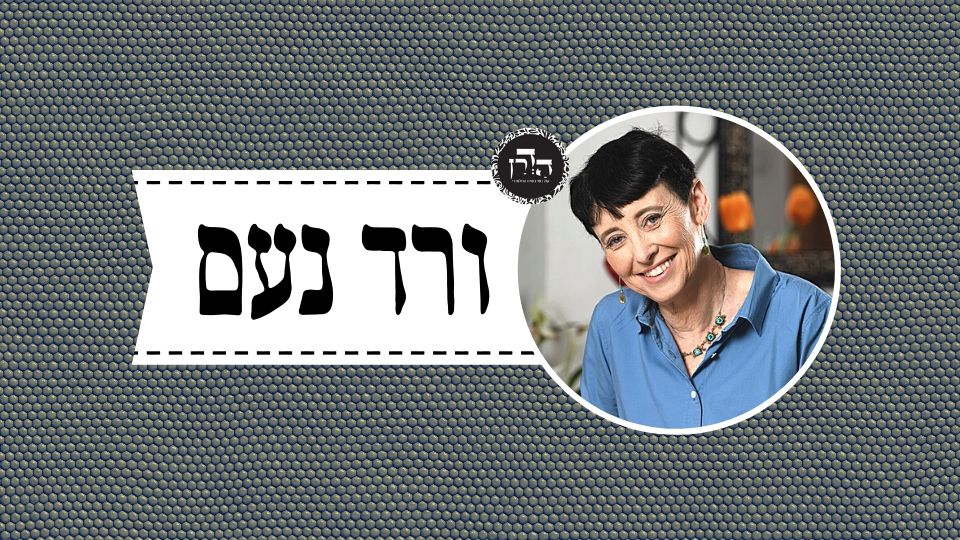רב הונא מלמד את בנו החשיבות בללמוד דברים הקשורים לבריאות כגון התנהגות בשירותים. דברים אלו הם חלק מהתורה. אם יש אפשרות לקנח בצרור או בחרס, מה עדיף? צרור או עשבים – מה עדיף? הגמרא מביאה עוד עניינים הקשורים לעצירות והצעות מה לעשות אם יש לך עצירות. מה הגודל של חרס שחייבים עליו משום הוצאה – 3 דעות? איזה מהם גדול יותר. פרק תשיעי מתחיל עם המקור לטומאת עבודה זרה. מחלוקת ר’ עקיבא ורבנן במסכת עבודה זרה. רבה ור’ אלעזר חולקים על מה בדיוק המחלוקת בין ר’ עקיבא לחכמים.

כלים
הלימוד החודש מוקדש לרפואת פיליס הכט, גיטל פעשא בת מאשה רחל על ידי חברותיה הרבות שאוהבות ומעריכות אותה.
כלים
העמקה
רוצה להבין מה באמת קורה מתחת לפני השטח של הסוגיה?
שיעורים, פודקאסטים והרחבות של מיטב המורות שלנו יפתחו לך עוד זוויות וכיווני חשיבה.
חדשה בלימוד הגמרא?
זה הדף הראשון שלך? איזו התרגשות עצומה! יש לנו בדיוק את התכנים והכלים שיעזרו לך לעשות את הצעדים הראשונים ללמידה בקצב וברמה שלך, כך תוכלי להרגיש בנוח גם בתוך הסוגיות המורכבות ומאתגרות.
פסיפס הלומדות שלנו
גלי את קהילת הלומדות שלנו, מגוון נשים, רקעים וסיפורים. כולן חלק מתנועה ומסע מרגש ועוצמתי.
שבת פב
דְּלָא מִקַּנַּח לְכוּ בְּחַסְפָּא, וְלָא קְטִיל לְכוּ כִּינָּא אַמָּנַיְיכוּ, וְלָא שְׁלִיף לְכוּ יַרְקָא וַאֲכִיל לְכוּ מִכִּישָּׁא דְּאָסַר גִּינָּאָה.
as you do not clean yourselves with an earthenware shard, and you do not kill lice on your garments, and you do not pull out a vegetable and eat it before you untie the bundle that was tied by the gardener? This implies that all these actions carry with them the danger of witchcraft.
אֲמַר לֵיהּ רַב הוּנָא לְרַבָּה בְּרֵיהּ: מַאי טַעְמָא לָא שְׁכִיחַתְּ קַמֵּיהּ דְּרַב חִסְדָּא, דִּמְחַדְּדָן שְׁמַעְתָּתֵיהּ? אֲמַר לֵיהּ: מַאי אֵיזִיל לְגַבֵּיהּ? דְּכִי אָזֵילְנָא לְגַבֵּיהּ מוֹתִיב לִי בְּמִילֵּי דְעָלְמָא. אָמַר לִי: מַאן דְּעָיֵיל לְבֵית הַכִּסֵּא לָא לִיתֵּיב בְּהֶדְיָא, וְלָא לִיטְרַח טְפֵי — דְּהַאי כַּרְכַּשְׁתָּא אַתְּלָת שִׁינֵּי יָתֵיב, דִילְמָא מִשְׁתַּמְטִי שִׁינֵּי דְכַרְכַּשְׁתָּא וְאָתֵי לִידֵי סַכָּנָה. אֲמַר לֵיהּ: הוּא עָסֵיק בְּחַיֵּי דִּבְרִיָּיתָא וְאַתְּ אָמְרַתְּ בְּמִילֵּי דְעָלְמָא?! כׇּל שֶׁכֵּן זִיל לְגַבֵּיהּ.
Rav Huna said to his son Rabba: What is the reason that you are not to be found among those who study before Rav Ḥisda, whose halakhot are incisive? Rabba said to him: For what purpose should I go to him? When I go to him, he sits me down and occupies me in mundane matters not related to Torah. For example, he said to me: One who enters a bathroom should not sit down immediately and should not exert himself excessively because the rectum rests upon three teeth, the muscles that hold it in place, and there is concern lest the teeth of the rectum dislocate through exertion and he come to danger. Rav Huna said to his son Rabba: He is dealing with matters crucial to human life, and you say that he is dealing with mundane matters? Now that I know what you meant, all the more so go before him.
הָיוּ לְפָנָיו צְרוֹר וָחֶרֶס, רַב הוּנָא אָמַר: מְקַנֵּחַ בַּצְּרוֹר וְאֵין מְקַנֵּחַ בַּחֶרֶס, וְרַב חִסְדָּא אָמַר: מְקַנֵּחַ בַּחֶרֶס וְאֵין מְקַנֵּחַ בַּצְּרוֹר. מֵיתִיבִי: הָיוּ לְפָנָיו צְרוֹר וָחֶרֶס — מְקַנֵּחַ בַּחֶרֶס וְאֵין מְקַנֵּחַ בַּצְּרוֹר, תְּיוּבְתָּא דְרַב הוּנָא! תַּרְגְּמַהּ רַפְרָם בַּר פָּפָּא קַמֵּיהּ דְּרַב חִסְדָּא אַלִּיבָּא דְרַב הוּנָא: בְּאוֹגְנֵי כֵּלִים.
The Gemara continues to discuss these halakhot. Rav Huna said: One who relieves himself and needs to wipe and has before him a stone and an earthenware shard, wipes with the stone and does not wipe with the earthenware shard, since he might injure himself. And Rav Ḥisda said: He wipes with the earthenware shard and does not wipe with the stone, which is set-aside. The Gemara raises an objection from a baraita: If one had before him a stone and an earthenware shard, he wipes with the earthenware shard and does not wipe with the stone. That is a conclusive refutation of the opinion of Rav Huna. Rafram bar Pappa explained it before Rav Ḥisda in accordance with the opinion of Rav Huna: It is not referring to earthenware shards, but to the smooth rims of vessels, which pose no danger.
הָיוּ לְפָנָיו צְרוֹר וַעֲשָׂבִים, רַב חִסְדָּא וְרַב הַמְנוּנָא, חַד אָמַר: מְקַנֵּחַ בַּצְּרוֹר וְאֵין מְקַנֵּחַ בָּעֲשָׂבִים, וְחַד אָמַר: מְקַנֵּחַ בָּעֲשָׂבִים וְאֵין מְקַנֵּחַ בַּצְּרוֹר. מֵיתִיבִי: הַמְקַנֵּחַ בְּדָבָר שֶׁהָאוּר שׁוֹלֶטֶת בּוֹ שִׁינָּיו הַתַּחְתּוֹנוֹת נוֹשְׁרוֹת! לָא קַשְׁיָא: הָא בְּלַחִין, הָא בִּיבֵשִׁין.
There were before him a stone and grasses. With regard to the preferred method to wipe on Shabbat, what is the ruling? There is a dispute between Rav Ḥisda and Rav Hamnuna. One said: He wipes with the stone and does not wipe with the grasses; and one said: He wipes with the grasses and does not wipe with the stone. The Gemara raises an objection from a baraita: One who wipes with something flammable, his lower teeth, which hold the intestines in place, fall out. How then, may one clean himself with grasses? The Gemara answers: This is not difficult: This, where it is permitted, is referring to moist grass; that, where it is prohibited, is referring to dry grass.
הַנִּצְרָךְ לִפָּנוֹת וְאֵינוֹ נִפְנֶה, רַב חִסְדָּא וְרָבִינָא, חַד אָמַר: רוּחַ רָעָה שׁוֹלֶטֶת בּוֹ, וְחַד אָמַר: רוּחַ זוּהֲמָא שׁוֹלֶטֶת בּוֹ. תַּנְיָא כְּמַאן דְּאָמַר רוּחַ זוּהֲמָא שׁוֹלֶטֶת בּוֹ, דְּתַנְיָא: הַנִּצְרָךְ לִנְקָבָיו וְאוֹכֵל — דּוֹמֶה לְתַנּוּר שֶׁהִסִּיקוּהוּ עַל גַּב אֶפְרוֹ, וְזוֹ הִיא תְּחִלַּת רוּחַ זוּהֲמָא.
The Gemara continues to discuss this topic. With regard to one who needs to defecate and does not do so, there is a dispute between Rav Ḥisda and Ravina. One said: An evil spirit dominates him; and one said: An odor of filth dominates him. It was taught in a baraita in accordance with the one who said that an odor of filth dominates him, as it was taught: One who needs to defecate and eats is comparable to an oven that was heated on top of its ashes; and that is the onset of an odor of filth.
הוּצְרַךְ לִיפָּנוֹת וְאֵינוֹ יָכוֹל לִיפָּנוֹת, אָמַר רַב חִסְדָּא: יַעֲמוֹד וְיֵשֵׁב, יַעֲמוֹד וְיֵשֵׁב. רַב חָנָן מִנְּהַרְדְּעָא אָמַר: יִסְתַּלֵּק לִצְדָדִין. רַב הַמְנוּנָא אָמַר: יְמַשְׁמֵשׁ בִּצְרוֹר בְּאוֹתוֹ מָקוֹם. וְרַבָּנַן אָמְרִי: יַסִּיחַ דַּעְתּוֹ. אֲמַר לֵיהּ רַב אַחָא בְּרֵיהּ דְּרָבָא לְרַב אָשֵׁי: כׇּל שֶׁכֵּן דְּכִי מַסַּח דַּעְתֵּיהּ לָא מִפְּנֵי! אֲמַר לֵיהּ: יַסִּיחַ דַּעְתּוֹ מִדְּבָרִים אֲחֵרִים. אָמַר רַב יִרְמְיָה מִדִּיפְתִּי: לְדִידִי חֲזֵי לִי הַהוּא טַיָּיעָא דְּקָם וְיָתֵיב וְקָם וְיָתֵיב עַד דְּשָׁפֵךְ כְּקִדְרָה.
The Gemara continues to discuss the issue: One who needed to defecate and is unable to do so, Rav Ḥisda said: He should stand and sit, stand and sit. Rav Ḥanan from Neharde’a said: He should move to the sides and attempt to relieve himself in a different spot. Rav Hamnuna said: He should manipulate with a stone in that place. And the Rabbis said: He should divert his thoughts to other matters. Rav Aḥa, son of Rava, said to Rav Ashi: All the more so that when he diverts his thoughts he will not be able to defecate. Rav Ashi said to him: He should divert his thoughts from other matters, and focus exclusively on his effort to relieve himself. Rav Yirmeya from Difti said: I saw a certain Arab who stood and sat, stood and sat, until it poured out of him like a pot. Apparently, that advice is effective.
תָּנוּ רַבָּנַן: הַנִּכְנָס לִסְעוּדַת קֶבַע, יְהַלֵּךְ עֶשֶׂר פְּעָמִים שֶׁל אַרְבַּע [אַרְבַּע] אַמּוֹת, וְאָמְרִי לַהּ: אַרְבַּע פְּעָמִים שֶׁל עֶשֶׂר עֶשֶׂר אַמּוֹת, וְנִפְנֶה, וְנִכְנָס וְיֹשֵׁב בִּמְקוֹמוֹ.
The Sages taught in a baraita: One who wishes to enter and partake of a regular meal that will last for some time, should pace a distance of four cubits ten times, and some say, ten cubits four times, in order to expedite the movement of the bowels, and defecate, and enter, and sit in his place.
מַתְנִי׳ חֶרֶס — כְּדֵי לִיתֵּן בֵּין פַּצִּים לַחֲבֵרוֹ, דִּבְרֵי רַבִּי יְהוּדָה. רַבִּי מֵאִיר אוֹמֵר: כְּדֵי לַחְתּוֹת בּוֹ אֶת הָאוּר. רַבִּי יוֹסֵי אוֹמֵר: כְּדֵי לְקַבֵּל בּוֹ רְבִיעִית. אָמַר רַבִּי מֵאִיר: אַף עַל פִּי שֶׁאֵין רְאָיָה לַדָּבָר, זֵכֶר לַדָּבָר: ״לֹא יִמָּצֵא בִמְכִתָּתוֹ חֶרֶשׂ לַחְתּוֹת אֵשׁ מִיָּקוּד״. אָמַר לוֹ רַבִּי יוֹסֵי: מִשָּׁם רְאָיָה? ״וְלַחְשׂוֹף מַיִם מִגֶּבֶא״.
MISHNA: One who carries out a shard of earthenware on Shabbat is liable if it is in a measure equivalent to that which is used to place between one pillar and another when piled on the ground to separate them; this is the statement of Rabbi Yehuda. Rabbi Meir says: In a measure equivalent to that which is used to stoke a fire with it. Rabbi Yosei says: In a measure equivalent to that which is used to hold a quarter of a log in it. Rabbi Meir said: Although there is no proof for the matter, there is a biblical allusion to my opinion, as it is stated: “And He shall break it as a potter’s vessel is broken, smashing it without sparing; and there shall not be found among its pieces a shard to rake fire on the hearth” (Isaiah 30:14). Rabbi Yosei said to him: Is there proof from there? The verse concludes: “And to extract water from the cistern,” indicating that earthenware is significant if it is large enough to hold water.
גְּמָ׳ אִיבַּעְיָא לְהוּ: שִׁיעוּרָא דְרַבִּי מֵאִיר נְפִישׁ, אוֹ שִׁיעוּרָא דְרַבִּי יוֹסֵי נְפִישׁ? מִסְּבָרָא — שִׁיעוּרָא דְרַבִּי יוֹסֵי נְפִישׁ, וּמִקְּרָא — שִׁיעוּרָא דְרַבִּי מֵאִיר נְפִישׁ. דְּאִי סָלְקָא דַּעְתָּךְ שִׁיעוּרָא דְרַבִּי יוֹסֵי נְפִישׁ, לָיֵיט לַהּ בְּמָנָא זוּטְרָא, וַהֲדַר לָיֵיט לַהּ בְּמָנָא רַבָּה?! אָמַר אַבָּיֵי: [מַתְנִיתִין נָמֵי] לַחְתּוֹת אֵשׁ מִיקִידָה גְּדוֹלָה.
GEMARA: A dilemma was raised before the Sages: Is the measure stated by Rabbi Meir greater, or is the measure stated by Rabbi Yosei greater? The Gemara responds: It is reasonable to say that the measure of Rabbi Yosei is greater; however, based on the verse it appears that the measure of Rabbi Meir is greater. As, if it enters your mind to say that the measure of Rabbi Yosei with regard to the shard of earthenware is greater, would the prophet first curse him by saying that a small vessel will not be found, and then curse him by saying that a larger vessel will not be found? Abaye said: The mishna is also referring to a large shard of earthenware required to stoke the fire of a large conflagration. Even in the mishna, Rabbi Meir’s measure is larger.
רַבִּי יוֹסֵי אוֹמֵר: מִשָּׁם רְאָיָה. שַׁפִּיר קָאָמַר לֵיהּ רַבִּי יוֹסֵי לְרַבִּי מֵאִיר! וְרַבִּי מֵאִיר ״לָא מִיבַּעְיָא״ קָאָמַר: לָא מִיבַּעְיָא מִידֵּי דַּחֲשִׁיב לְאִינָשֵׁי דְּלָא לִישְׁתְּכַח לֵיהּ, אֶלָּא אֲפִילּוּ מִידֵּי דְּלָא חֲשִׁיב לְאִינָשֵׁי לָא לִישְׁתְּכַח לֵיהּ.
We learned in the mishna that Rabbi Yosei said to him: Is there proof from there? He cites proof for his opinion from the conclusion of that same verse. The Gemara comments: Rabbi Yosei spoke well to Rabbi Meir. And how does Rabbi Meir address that proof? He explains that the verse is stated employing the style of: There is no need. It should be understood as follows: There is no need to say that an item that is significant to people, e.g., a large shard of earthenware to stoke a fire, shall not be found, but even an item that is insignificant to people, i.e., a shard to extract water, shall not be found. Therefore, the conclusion of the verse does not contradict Rabbi Meir’s opinion.
הדרן עלך המוציא יין
מַתְנִי׳ אָמַר רַבִּי עֲקִיבָא: מִנַּיִין לַעֲבוֹדָה זָרָה שֶׁמְּטַמְּאָה בְּמַשָּׂא כְּנִדָּה, שֶׁנֶּאֱמַר: ״תִּזְרֵם כְּמוֹ דָוָה צֵא תֹּאמַר לוֹ״ — מָה נִדָּה מְטַמְּאָה בְּמַשָּׂא, אַף עֲבוֹדָה זָרָה מְטַמְּאָה בְּמַשָּׂא.
MISHNA: Rabbi Akiva said: From where is it derived that idolatry, e.g., a statue of a deity, transmits impurity imparted by carrying even when the person who carries it does not come into contact with it, just as a menstruating woman does? As it is stated: “And you will defile the silver overlays of your statues, and the golden plating of your idols, you will cast them away as you would a menstruating woman [dava], you will tell it, get out” (Isaiah 30:22). Just as a menstruating woman transmits impurity imparted by carrying, so too, idolatry transmits impurity imparted by carrying.
גְּמָ׳ תְּנַן הָתָם: מִי שֶׁהָיָה בֵּיתוֹ סָמוּךְ לַעֲבוֹדָה זָרָה וְנָפַל, אָסוּר לִבְנוֹתוֹ. כֵּיצַד יַעֲשֶׂה? כּוֹנֵס לְתוֹךְ שֶׁלּוֹ אַרְבַּע אַמּוֹת וּבוֹנֶה.
GEMARA: Since the halakhot of idolatry and the impurity it causes are beyond the scope of tractate Shabbat, the fundamentals of this halakha are cited from tractate Avoda Zara. We learned in a mishna there: One whose house was adjacent to a house of idolatry, sharing a common wall, and the dividing wall fell, it is prohibited to rebuild it as he would thereby have built a wall for idol worship. What should one do? He moves four cubits into his own land and builds the wall there.
הָיָה שֶׁלּוֹ וְשֶׁל עֲבוֹדָה זָרָה, נִידּוֹן מֶחֱצָה עַל מֶחֱצָה. אֲבָנָיו וְעֵצָיו וַעֲפָרָיו מְטַמְּאִים כְּשֶׁרֶץ, שֶׁנֶּאֱמַר: ״שַׁקֵּץ תְּשַׁקְּצֶנּוּ וְגוֹ׳״. רַבִּי עֲקִיבָא אוֹמֵר כְּנִדָּה, שֶׁנֶּאֱמַר: ״תִּזְרֵם כְּמוֹ דָוָה״ — מָה נִדָּה מְטַמְּאָה בְּמַשָּׂא, אַף עֲבוֹדָה זָרָה מְטַמְּאָה בְּמַשָּׂא. אָמַר רַבָּה: ״תִּזְרֵם״ דְּאָמַר קְרָא, נַכְּרִינְהוּ מִינָּךְ כְּזָר. ״צֵא תֹּאמַר לוֹ״ — הִכָּנֵס אַל תֹּאמַר לוֹ.
If the wall stood upon ground that belonged to him and to the house of idolatry, the area is calculated as half and half as far as moving into his property before rebuilding the wall, and one may build the wall four cubits from the middle of the wall. Its stones and its wood and its dust from the house of idolatry transmit impurity like creeping animals, and by rabbinic decree, one who touches them becomes impure like one who touches a creeping animal, as it is stated: “And you shall not bring an abomination into your house and become banned like it, you shall utterly detest it [shaketz teshaketzenu] and you shall utterly abhor it, for it is a banned object” (Deuteronomy 7:26). Shaketz is a term used with regard to creeping animals. Rabbi Akiva says: Idolatry transmits impurity like a menstruating woman, as it is stated: “You will cast them away as you would a menstruating woman [dava]” (Isaiah 30:22). Just as a menstruating woman transmits impurity imparted by carrying, as one who moves a menstruating woman without touching her becomes impure, so too, idolatry transmits impurity imparted by carrying. Rabba said in explanation of that which the verse said: “You will cast them away”: Make them foreign to you like a stranger. The end of the same verse: “You will tell it, get out” means that under no circumstances can you say to it, come in.
וְאָמַר רַבָּה: בְּמַשָּׂא דְּכוּלֵּי עָלְמָא לָא פְּלִיגִי דִּמְטַמְּאָה, דְּהָא אִתַּקַּשׁ לְנִדָּה. כִּי פְּלִיגִי בְּאֶבֶן מְסָמָא. רַבִּי עֲקִיבָא סָבַר כְּנִדָּה: מָה נִדָּה מְטַמְּאָה בְּאֶבֶן מְסָמָא — אַף עֲבוֹדָה זָרָה מְטַמְּאָה בְּאֶבֶן מְסָמָא. וְרַבָּנַן סָבְרִי כְּשֶׁרֶץ: מָה שֶׁרֶץ לֹא מְטַמֵּא בְּאֶבֶן מְסָמָא — אַף עֲבוֹדָה זָרָה לֹא מְטַמְּאָה בְּאֶבֶן מְסָמָא.
And to the essence of the dispute, Rabba said: With regard to impurity imparted by carrying, everyone agrees that idol worship transmits impurity, as it is juxtaposed to a menstruating woman in the verse. Where they argue, it is with regard to the halakha of a very heavy stone. There is a special law with regard to the ritual impurity of a zav and a menstruating woman. If they sit on an object, even if it is an object that cannot become ritually impure, and beneath that object is a vessel, even though the weight of the zav and the menstruating woman has no effect on the vessel, it becomes ritually impure. Rabbi Akiva holds that the impurity of idolatry is like the impurity of a menstruating woman in all respects; just as a menstruating woman transmits impurity via a very heavy stone, so too, idolatry transmits impurity via a very heavy stone. And the Rabbis hold that in this regard, the impurity of idolatry is like the impurity of a creeping animal; just as a creeping animal does not transmit impurity via a very heavy stone, so too, idolatry does not transmit impurity via a very heavy stone.
וּלְרַבִּי עֲקִיבָא, לְמַאי הִלְכְתָא אִיתַּקַּשׁ לְשֶׁרֶץ? — לִמְשַׁמְּשֶׁיהָ. וּלְרַבָּנַן, לְמַאי הִלְכְתָא אִיתַּקַּשׁ לְנִדָּה? — לְמַשָּׂא. וְלַקְּשֵׁיהּ רַחֲמָנָא לִנְבֵלָה! אִין הָכִי נָמֵי, אֶלָּא: מָה נִדָּה אֵינָהּ לְאֵבָרִין, אַף עֲבוֹדָה זָרָה אֵינָהּ לְאֵבָרִין. וְאֶלָּא הָא דְּבָעֵי רַב חָמָא בַּר גּוּרְיָא: עֲבוֹדָה זָרָה יֶשְׁנָהּ לְאֵבָרִין אוֹ אֵינָהּ לְאֵבָרִין? תִּיפְשׁוֹט לֵיהּ מֵהָא, דִּלְרַבָּנַן אֵינָהּ לְאֵבָרִין! רַב חָמָא בַּר גּוּרְיָא אַלִּיבָּא דְרַבִּי עֲקִיבָא בָּעֵי לַהּ.
The Gemara asks: And according to Rabbi Akiva, who holds that the impurity of idolatry is similar to that of a menstruating woman in all respects, for what halakha was it juxtaposed to a creeping animal? The Gemara explains: In his opinion, it was not stated in reference to idolatry itself, but rather to its accessories, objects used for the purposes of idolatry. The Gemara asks further: And according to the Rabbis, for what halakha was it juxtaposed to a menstruating woman? To teach that it transmits impurity through carrying. And instead of juxtaposing idolatry to both a menstruating woman and to creeping animals, let the Torah juxtapose it to an animal carcass, which transmits impurity through carrying and does not transmit impurity via a very heavy stone, since according to the Rabbis the law is the same for idolatry. The Gemara answers: Yes, it is indeed so. In that sense, juxtaposition to an animal carcass would suffice. However, the juxtaposition to a menstruating woman teaches: Just as a menstruating woman does not transmit impurity through limbs, as if the limb of a menstruating woman is supported by a vessel, the vessel does not become ritually impure (Ra’avad), so too, idolatry does not transmit impurity through limbs, as a severed part of an idol does not transmit impurity. The Gemara is puzzled by this: But that which Rav Ḥama bar Guria raised as a dilemma: Does idolatry have the capacity to transmit impurity through limbs or does it not have the capacity to transmit impurity through limbs? Resolve the dilemma from this, as according to the opinion of the Rabbis, it does not transmit impurity through limbs. And the Gemara replies: Although that is so, Rav Ḥama bar Guria raised the dilemma in accordance with the opinion of Rabbi Akiva and the dilemma is unresolved.
וְרַבִּי אֶלְעָזָר אָמַר: בְּאֶבֶן מְסָמָא דְּכוּלֵּי עָלְמָא לָא פְּלִיגִי דְּלָא מְטַמְּאָה. כִּי פְּלִיגִי בְּמַשָּׂא: רַבִּי עֲקִיבָא סָבַר כְּנִדָּה, מָה נִדָּה מְטַמְּאָה בְּמַשָּׂא — אַף עֲבוֹדָה זָרָה מְטַמְּאָה בְּמַשָּׂא. וְרַבָּנַן סָבְרִי כְּשֶׁרֶץ, מָה שֶׁרֶץ לֹא מְטַמֵּא בְּמַשָּׂא — אַף עֲבוֹדָה זָרָה לֹא מְטַמְּאָה בְּמַשָּׂא. וְרַבִּי עֲקִיבָא, לְמַאי הִלְכְתָא אִיתַּקַּשׁ לְשֶׁרֶץ? לִמְשַׁמְּשֶׁיהָ. וְרַבָּנַן לְמַאי הִלְכְתָא אִיתַּקַּשׁ לְנִדָּה? מָה נִדָּה אֵינָהּ לָאֵבָרִים, אַף עֲבוֹדָה זָרָה אֵינָהּ לְאֵבָרִים.
And in another approach to this dispute, Rabbi Elazar said: With regard to a very heavy stone, everyone agrees that idolatry does not transmit impurity in that manner. Where they disagree is with regard to impurity imparted by carrying. Rabbi Akiva holds that the legal status of idolatry is like that of a menstruating woman: Just as a menstruating woman transmits impurity through carrying, so too, idolatry transmits impurity through carrying. And the Rabbis hold that the legal status of idolatry is like that of a creeping animal: Just as a creeping animal does not transmit impurity through carrying, so too, idolatry does not transmit impurity through carrying. The Gemara asks: And according to Rabbi Akiva’s opinion, with regard to what halakha was idolatry juxtaposed to a creeping animal? The Gemara answers: With regard to the halakha that its accessories do not transmit impurity through carrying. The Gemara asks: And according to the Rabbis, with regard to what halakha was idolatry juxtaposed to a menstruating woman? The Gemara answers: Just as a menstruating woman does not transmit impurity through her limbs, so too, idolatry does not transmit impurity through its limbs.


